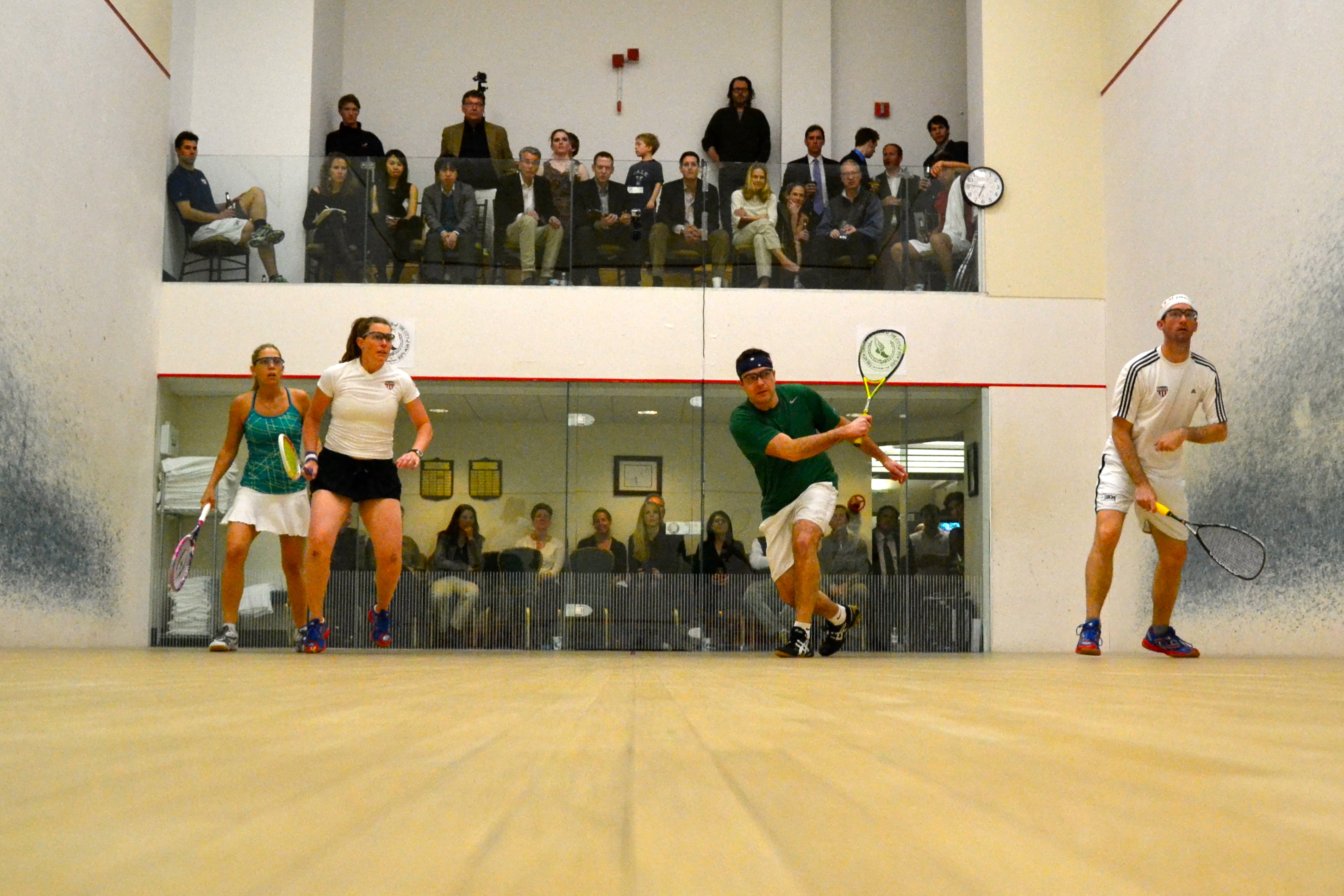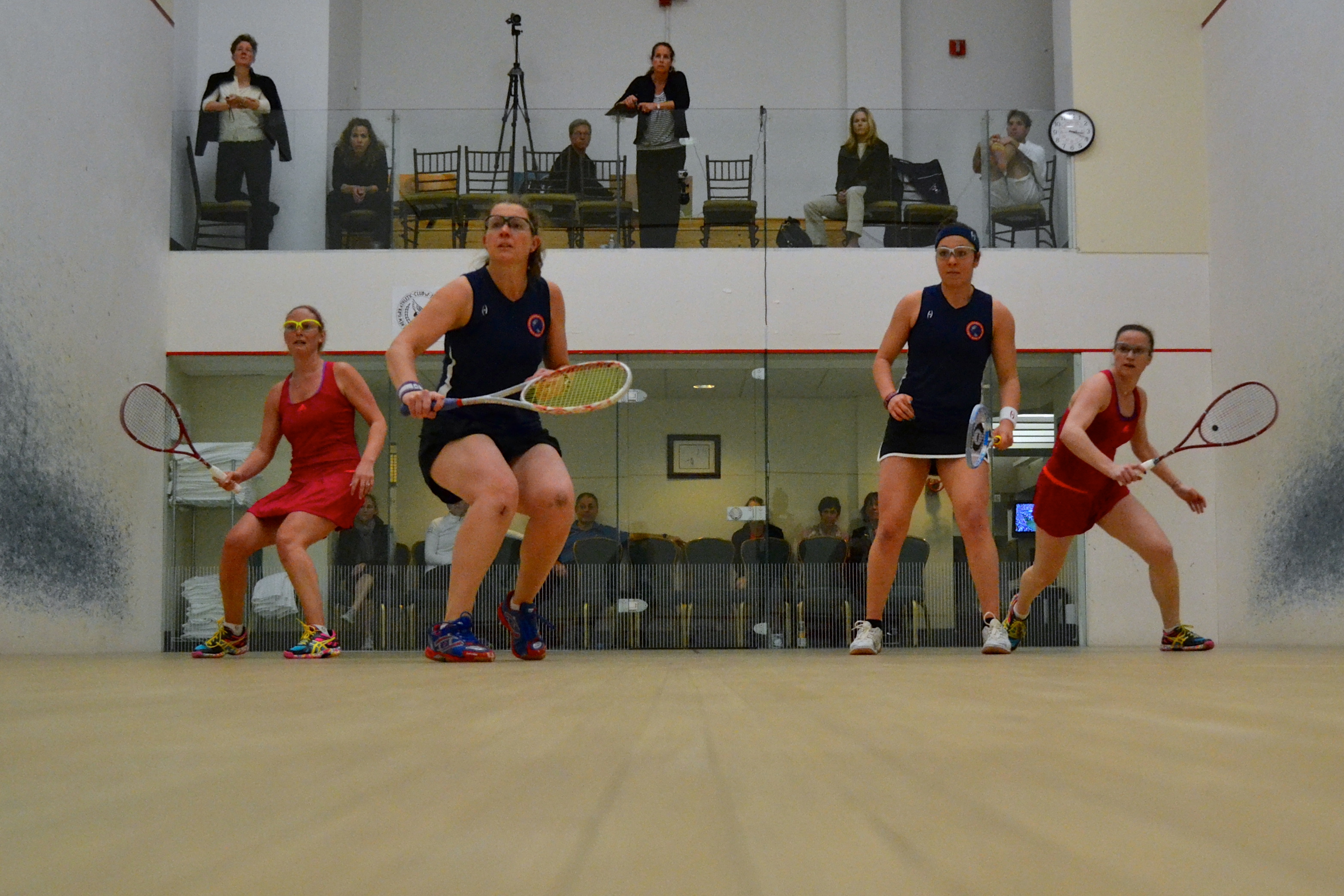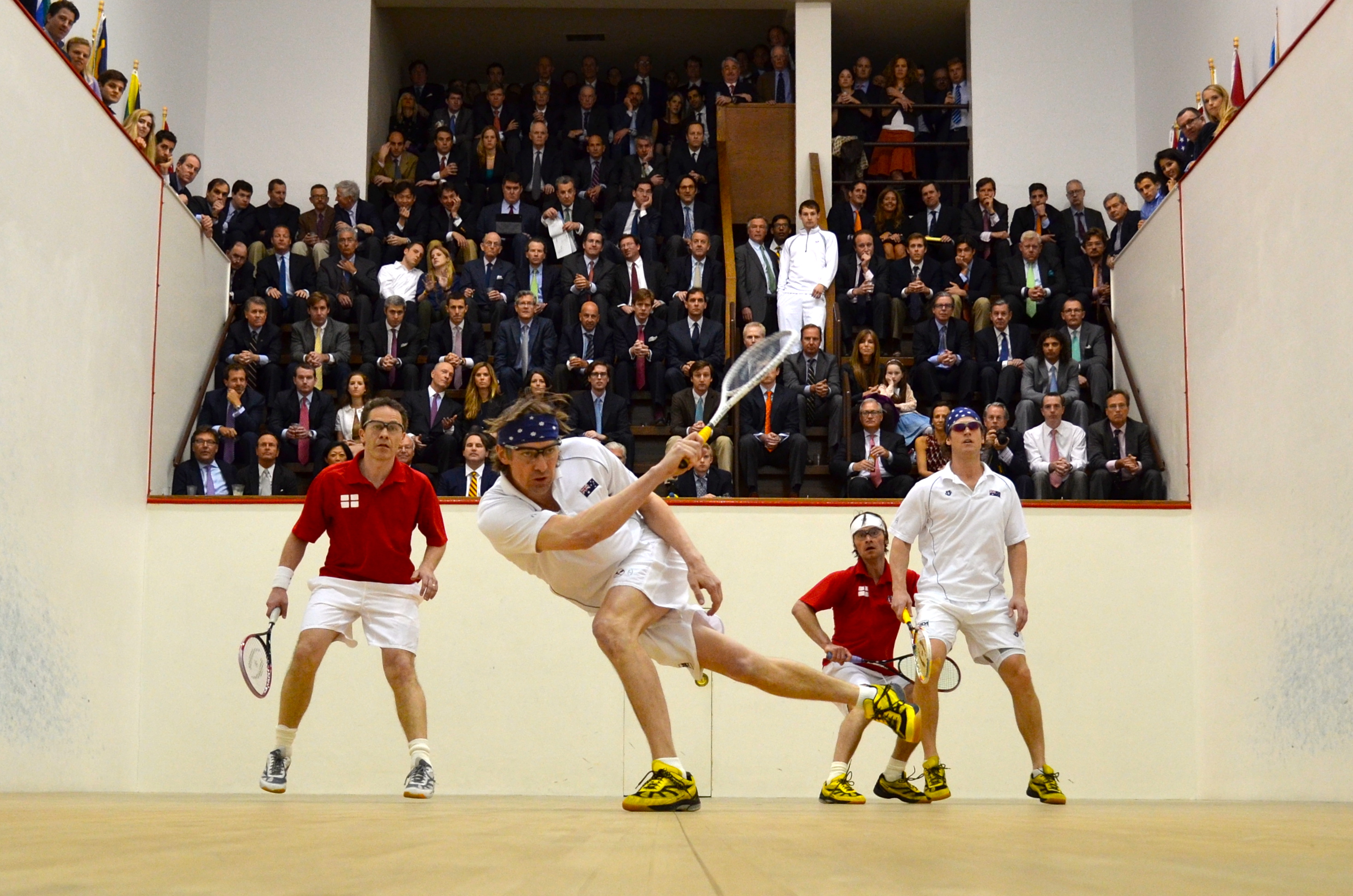
By Kristi Maroc
It was a victory for the USA in the women’s draw of the 2013 World Doubles Championships, with home heroines Amanda Sobhy and Natalie Grainger taking the title in the Turner Women’s Open division.
Held in New York and brining together the world’s best hardball doubles players, the World Doubles Championships saw 95 competitors from 19 countries across the globe team up to represent their nation in the men’s, women’s and mixed divisions.
The women’s final match was an all-North American affair with top seeds Grainger and Sobhy taking on Canada’s Seanna Keating and Stephanie Hewitt, number two seeds in the draw and defending champions of the title.
Grainger/Sobhy comfortably defeated Keating/Hewitt in three games, 15-7, 15-11, 15-7, to take the title, the prominent win marking only one of a handful of times that Sobhy has played a professional level doubles event.
Sobhy, 19 years old and a professional singles player on the Women’s Squash Association World Tour, said the win was a motivation for her further career prospects.
“I am definitely seeing a doubles career in my future following my singles career!” she said.
“Winning the World Doubles felt amazing. It’s always great to win a tournament, and to be World Doubles champions is especially great, considering I only play about two doubles events a year.”
Just weeks before, Grainger and Sobhy competed against each other on the singles court in the final of the 2013 U.S. National Championships, adding an interesting dimension to the partnership when they took the court as a team for the World Doubles.

However, Sobhy says that transferring the competitive energy into a partnership wasn’t at all difficult.
“I’ve known Natalie for such a long time and she has coached me when I first started at age 13, so I think the weird part is having to compete against her.
“She was a mentor for me when I was growing up, and I’ve been so used to playing alongside her, so playing in the doubles felt extremely normal, while playing against her felt weird,” she added.
In the men’s division, Aussie all-star team Damien Mudge and Ben Gould added another trophy to their already impressive collection, defeating England’s Jonny Smith and Clive Leach to take out the Kellner Men’s Open division.
In the championship final Mudge and Gould, who have dominated the pro doubles scene since they teamed up in 2010, defeated Smith and Leach in three breathtaking games 15-8, 15-9, 15-9.
As top seeds and defending champions, they had already cruised through two three-nil wins to make their way toward the final, beating the US team of Christopher Callis and Alex Domenick in the first round, followed by South Africans Regardt Schonborn and Jacques Swanepoel in the round of 16.
They next won two four-game matches in the quarterfinals and semifinals, against eighth seeds Imran Khan and Baset Chaudhry of Pakistan, and USA’s Preston Quick and Gregory Park, to comfortably set up the finals match.
Both Mudge and Gould are head squash professionals, at the University Club of New York and the New York Racquet and Tennis Club respectively, which were both host venues for the World Doubles.
“It was a very long and hard season, and so it was great to finish off the season with this tournament in New York at our clubs,” said Mudge.
“Playing in the finals at the R&T [Racquet and Tennis Club] was a great experience. It creates an amphitheater feel, and having a lot of the University Club members there made it that much more special.

“The opening ceremony was a great highlight—seeing all of the ninety plus participants on the doubles court at the University Club was really cool,” he added.
Gould said that the World Doubles is particularly unique to the many other tournaments the pair compete in.
“It’s the only time we play for our country, and the only pro doubles event sanctioned by the World Squash Federation,” he said.
“It was special for me to win the event in front of a packed and boisterous home crowd at the R&T. Probably even more important to me though, as one of the tournament organizers was to see the record number of countries participating, a record level of prize money raised, and amazing support from patrons and fans at every site.
“The New York City 2013 World Doubles has significantly raised the bar,” he said.
Australia had another victory in the mixed division, with Paul Price and Narelle Krizek crowned the Richmond Mixed Open World Doubles champions following their finals match against the US partnership of Preston Quick and Natalie Grainger.
The last time a mixed division was held during the World Doubles, in 2007, the title was won by Quick and Krizek who teamed together as a transnational team, so this year’s finals match saw the defending champions compete against on another.
“It was very strange,” said Krizek. “Before I went on the court I said to myself, wow this is wild, last time they had a world mixed you won it with Preston, how ironic! But also how cool that we are still competing at a game we truly love,” she added.
The intense four-game final fell smoothly in favor of the Aussies in the first two games, 15-7, 15-6, but Quick and Grainger climbed back in the third from 10-6 down to take the game 15-10. However, the Americans narrowly missed out on evening up the stakes in the forth, going down 15-13 in a nail biting finish.
“We played a great match and Narelle was awesome,” said Paul.
“It got tight there for a bit but we managed to get the momentum back and close it out.
“Winning with Narelle made it more special, given how long we have been friends.”
Narelle echoed the sentiments.
“It was the best mixed event ever held, and it was so special to play it with someone I grew up with and have been friends with since we were 17,” said Krizek.
“Paul and I went through the tough times on the singles tour together, though I never quite achieved what Paul did as number three in the world. To now turn around in our 30s and win a title again for Australia is very special.
“The finals match was the most relaxed I felt the whole weekend. I knew we had a great game plan and I felt so confident with Paul as my partner that I could relax and play my game.
“To play for your country is a true honor and as an Australian to wear green and gold and to win a title again for them is fantastic. My little half Australian, half American kids were cheering for me and Paul wearing green and gold at home.
“Another highlight was that I got to compete in the women’s event with my sister Natarsha. To play for Australia with your sister as your partner is the most amazing feeling you could have.”
“It was the first time in doubles history that we have had that many teams compete from so many countries. We have all worked really hard to grow doubles and it showed by the caliber of players at this event, so to win a title, with the top players in the world competing makes the win even more special,: continued Krizek.
“The event was a true showcase for the growth of doubles in North America.”
The World Doubles Championships was held in five different venues in New York City from April 10-15.





